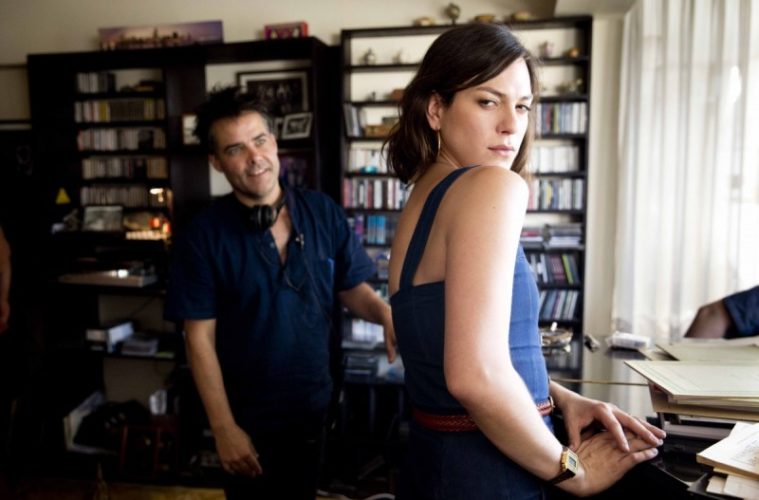
Sebastián Lelio could become the first Chilean director to win Best Foreign Language Film at the Academy Awards this Sunday. A Fantastic Woman stars Daniela Vega in what Lelio calls a “transgenre” drama about a transgender woman’s struggle to grieve her lover Orlando’s (Francisco Reyes) death.
The film chooses classical cinematic storytelling over the gritty, social realism used for documentaries like The Death and Life of Marsha P. Johnson. In the film, after Orlando dies, his family mistreat and abuse Vega’s Marina, barring her from his funeral. Instead of using Vega’s transgenderism to move the plot, Lelio focuses on the inhumane treatment Marina receives from characters on-screen and a mythic fight against gravity.
In our conversation, Lelio discusses the subversive casting of Chilean actor Francisco Reyes as Orlando, Daniela Vega’s influence on his script, and pushback against the film.
I read you shied away from the social realist approach that is often used for transgender characters. How did you come to that decision?
I think there is a moral behind every aesthetic choice. I wanted to change the aesthetics around a narrative that serves a transgender character. Usually it’s like handheld, raw light. There’s a roughness to it. And I think it’s perfectly valid to try to provide a different angle and one of my first intuitions was to change the aesthetics with which the subject has been explored before. That’s why the film has that attempt to have splendor and be classical. It’s almost like you sit down and you start watching a 1940s melodrama. Then the film keeps changing and changing and it has something hidden inside that is not classical at all. It’s the character, maybe more importantly the gesture, that your character is interpreted by a real transgender woman.

How did you come to cast Francisco Reyes as Orlando? It was great to see him appearing as this apparition throughout the film.
Well, he’s a well-known actor in Chile and a symbol of heterosexual masculinity. I admired him as an actor in the first place but it was a bit of a provocation to cast him because he’s so beloved and an icon of heterosexuality. I think he was very graceful in presenting a different way of masculinity. It probably would have been more acceptable to present a less classical type of masculinity. His normality makes everything about his relationship in the film with Marina subversive.
Will you talk about filming the dance sequence?
In the writing process, this idea of creating a transgenre film about a transgender character was very important because suddenly this device was capable of shifting everything. It has that sentiment of social portrait; it’s a film about a woman, it’s a ghost film. There was even room for these enhanced reality moments, or surreal moments. I hate to call them magical realism moments because that’s a concept we are very careful with in Latin America. Then I decided to take on the pressure to pay homage to films I love. So the windstorm sequence is a salutation to Buster Keaton and then the dancing sequence, we were watching a lot of the Busby Berkeley films and how he created his choreography with women. In one of his films a few of them fly meters away from the camera so we were playing with that idea. It was available to me to bend the limits of what was possible in the film and to push things forward.

The movie deals with a lot of ideas about humane and not-so humane treatment of transgender people. Will you talk about your thoughts on the changing conceptions of transgenderism?
It’s hard to put everything in the same bag, but I think the limits of what’s possible are expanding. The mindset of what being a human means is expanding in many different ways and different areas. So I think that things are changing and we are shifting landscape in terms of identity or in terms of what identity means. So the old conceptions of male, female, even class, race and gender are somehow not enough anymore. But most importantly it will shake up things and create more space and ways of existing.
Daniela Vega’s life informed much of the script. In a sense, it blurs the line of fiction and non-fiction. How do you interpret it when someone doesn’t understand or doesn’t like the movie? Are they saying they don’t agree with transgenderism?
When you are on the side of the people who create things, you have to know you will find resistance and friction. I consider that healthy. If the film didn’t find any kind of resistance it would mean that the film has no urgency at all. Although it wasn’t our idea to offend, but to create something that is alive and complex, that can be seen from many different angles. It’s a film that is presenting a problem and fighting to deal with it. So just like with anything, there will be people going in different ways with this phenomena. Some people say God created man and woman and that transgender people should be locked up. A percentage of the population think this and that’s precisely why the film is urgent. Another attitude toward the film is Daniela’s character is presenting something we will learn so much from and it’s beautiful to try to attempt to learn how to live together. I want the negativity. I think it’s a sign that the image alive.

A Fantastic Woman in now in theaters.

